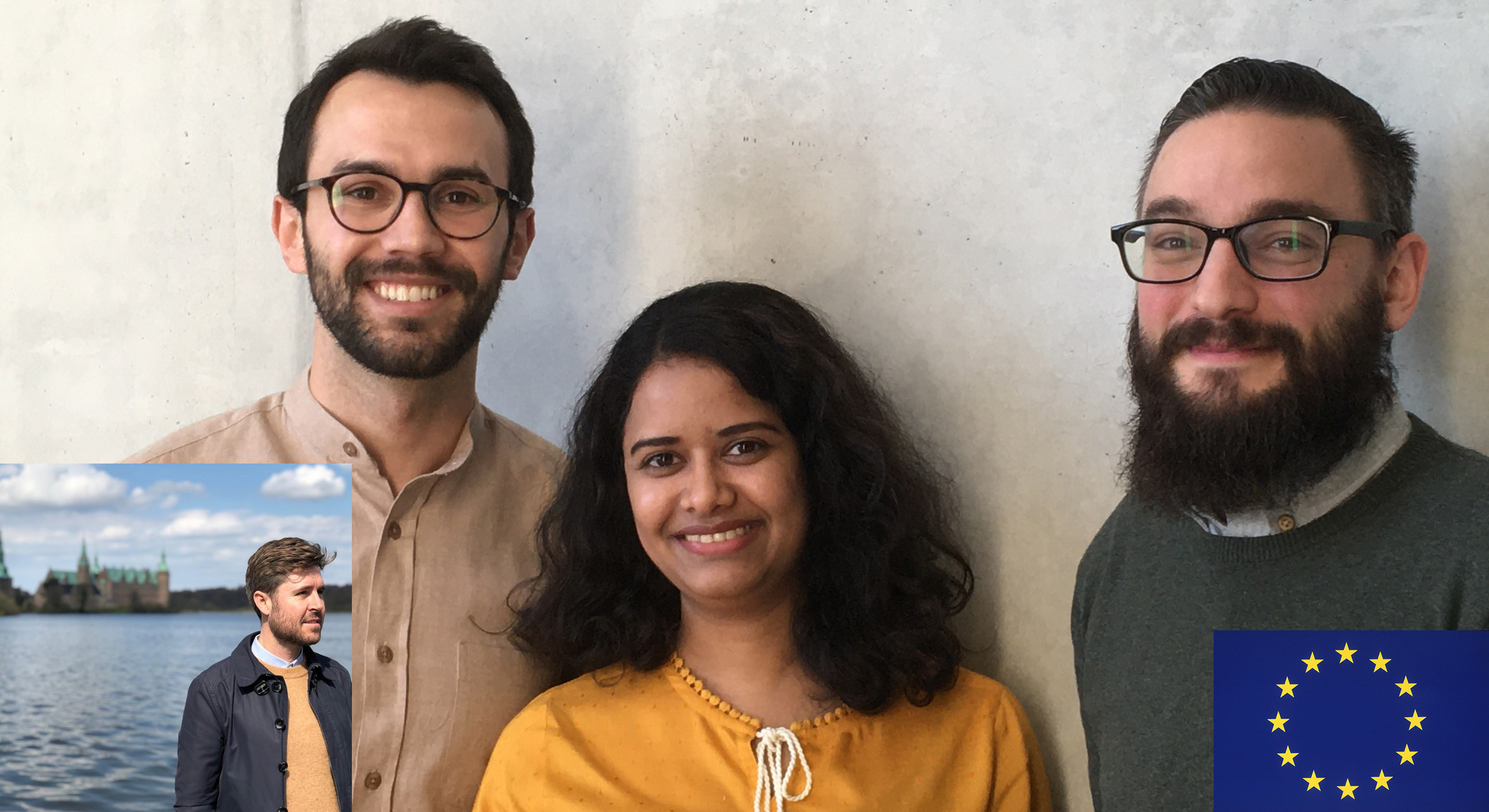4 BRIC researchers receive the prestigious Marie Curie individual fellowship
Once again, BRIC has been very successful in the MSCA individual fellowship round. This year 4 out of 7 of the research proposals were funded!
Congratulations to our new MSCA fellows: Raul Bressan, Jayashree Thatte, Juan Lafuente and Isaac Hurtado Guerrero. On top Juan Lafuente got the highest score (99/100) of all applications from Denmark within the field of Life sciences.

The four projects that will be initiated within the next year at BRIC is:
Raul Bressan (Jensen group): Dissecting the molecular mechanisms underlying YAP activation in intestinal tissue repair
Jayashree Thatte (Sørensen group): Unraveling novel Familial Breast Cancer (FBC) predisposition genes
Juan Lafuente (Andersen group): Delineating epigenome regulators as functional survival dependencies in intrahepatic cholangiocarcinoma
Isaac Hurtado Guerrero (Issazadeh-Navikas group): Soluble IFNAR2 in Parkinson's disease and its role in the regulation of IFNβ in a neuroinflammatory context
We asked the fellows what it means to them to receive the Marie Curie Fellowship, and we asked Séverine Le Bras and Lisbeth Rosager, both Senior Scientific Officers in the Strategic Research Support office, how they support the applicants. Finally we asked the fellows what advice they would give to candidates, considering to apply for the fellowship.
What does it mean to you, to receive the Marie Curie Fellowship?
Raul: To varying degrees all postdocs experience anxiety and doubt – about ourselves and our projects. In this regard, receiving the fellowship has been quite reassuring – it meant I have a good, scientifically-sound project in hand and enough qualifications to carry it out. Two extra years on your contract and the value that it adds to your CV are also gratifying. Being a postdoc is slightly more fun now.
Jayashree: I feel very much honored to receive such a prestigious grant! This fellowship means ‘first successful step’ in my scientific career. This means ‘I can do it, and I have to keep doing it’! This achievement is going to give me lot of courage and motivation to achieve my goal, to become an excellent researcher.
Juan: Receiving the Marie Curie fellowship represents a major milestone in my scientific career. It means a great opportunity to keep learning and growing, both scientifically and personally. I look forward to this next two years with expectation.
Isaac: A great joy and fulfillment, as this is one of the most prestigious fellowships that a postdoctoral can get in Europe and it means a huge step forward for me and my future career.
How does BRIC support MSCA applicants?
Séverine & Lisbeth: We offer extensive support for our MSCA individual fellowship applicants whether or not the applicant is already at BRIC at the application time. To support our candidates, we make sure that the host PIs engage in the idea generation and application phase. Furthermore, we have generated and run an in-house intensive MSCA workshop. Our support also includes two read through of the application and an open-door/e-mail policy to increase the direct contact with the applicants. If you are not already hired at BRIC at the application time you are invited to participate in the onsite workshop and if this is not possible, we share all our written material and support the offsite candidate to the same extent as the internal. First step to be engaged in this programme is that you establish contact with the PI of the host lab and agree with the PI that you will be applying.
What is your advice for other candidates thinking about applying for the Marie Curie Fellowship?
Raul: Brace yourselves! The application is a lengthy (and tiring) process. It requires multiple rounds of polishing up. Start drafting it as soon as possible and allow some time in between the revisions, so that you can re-start with fresh eyes. Perhaps most importantly, attend the MSCA workshops and follow strictly Severine’s and Lisbeth’s advice. It’s all worth it in the end. If you get the fellowship, there will be cake and champagne to celebrate - and some hugs from your colleagues too.
Jayashree: I would like to encourage other candidates to give their best and attempt to write such an exciting Grant. No matter whether you get it or not, definitely you get to learn a lot from it. It truly tests and develops both your scientific and communication skills.
Juan: The MSCA fellowship is not a grant that you can prepare in a few weeks before the deadline. The sooner you start preparing and getting in the right mindset the better, as this will allow you to take periods of disconnection during the process, so you can revisit your writing with a refreshed point of view. Also, get as many people as possible to read it and give you feedback that is key to ensure that you will be able to please a bigger spectrum of possible reviewers and anybody can understand your text, not just you and your peers.
Isaac: I encourage everyone to try and apply for it. First, I think that it is very important to find a competitive host lab in which you can get a great scientific training. I also believe that is essential to develop a novel and attractive project with your host PI. Then, you need to make a great effort preparing the proposal, but at the same time this is also beneficial for you as it involves a training for future development of European projects.
